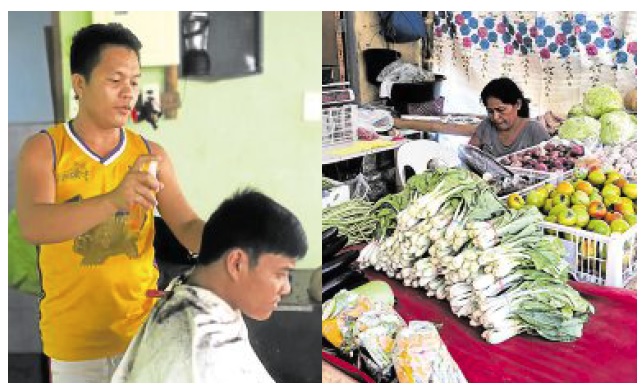Taal folk: Hunger deadlier than coronavirus

SURVIVAL Taal evacuees at a government housing site in Ibaan, Batangas, find ways to survive. Jun-jun Carpio (left) offers haircut for P40 while another family opens a vegetable stall to earn extra cash. —CLIFFORD NUÑEZ
IBAAN, Batangas, Philippines — For people who survived the wrath of Taal Volcano in January, any threat from the coronavirus lurking beyond the fence of Sea Breeze Residences, their new community here, is “far from the gut.”
When the Inquirer visited the relocation site on Saturday, the atmosphere was no more than a sweltering summer afternoon, as if the country was not battling a deadly disease.
Children were busy picking sticks and stones in a dusty, open lot next to a gymnasium, as mothers hung dry their laundry on clotheslines that pierced the rows of unfinished housing units. Shirtless boys shared a bath by a deep well pump on a corner block, while girls huddled at doorsteps removing each other’s head lice.
“Eto, tambay lang; wala namang trabaho (We don’t have jobs),” said Marlon Rosero, 28.Counting the daysRosero used to be a fish cage caretaker in Taal Lake before the Jan. 12 Taal volcanic eruption forced him and more than 1,500 people off the Volcano Island.
Sea Breeze, a National Housing Authority project originally intended for policemen and soldiers in Barangay Talaibon, became the “interim” resettlement area.
Article continues after this advertisementLito Castro, chief of the Batangas Provincial Disaster Risk Reduction and Management Office, said the health conditions of the evacuee were being monitored regularly. So far, none had contracted or shown symptoms of the new coronavirus disease.
Article continues after this advertisementBut as early as March, Batangas officials said public and private donations had stopped as the attention shifted from the eruption victims to a national health crisis.
Rosero, for instance, said his family was just counting the days to see how long the canned goods and money they had collected from previous donation drives would last.
Face masks are a luxury. Evacuees would wear them only when leaving the compound on Tuesdays and Fridays, the designated market days in Ibaan town center. No jobs
Social distancing seems to be a vague concept.
At the gymnasium, Jun-jun Carpio, 28, set up a plastic chair and took out an old pair of cutting shears and razor. He offered haircuts to fellow evacuees for P40.
“They charge P60 (in the town center), but I can’t do that here because people don’t have the money to pay me anyway,” he said. Even if they wanted to, Carpio, a father of two young children, said there were just no jobs available for them right now, not even as construction workers or as jeepney or tricycle drivers, because of the lockdown.
Batangas, as well as the rest of Calabarzon (Cavite, Laguna, Batangas, Rizal, Quezon) region, remains under an enhanced community quarantine until May 15. The Department of Health records as of April 26 showed that 848 people in the region had contracted the virus, of which 106 had died.
In recent weeks, some of the men in Sea Breeze were hired by the government to clear away the weeds and debris in the relocation site. They were paid P2,000 each for the job under the labor department’s cash assistance package.
Only a few qualified to the cash aid program of the national government.
“I used to have a big house with two (bed)rooms (on Volcano Island). It was all gone now, buried in the ash,” said Baralio Umali, 62.
Umali lost his wife, a diabetic, on Feb. 7 and his 42-year-old daughter, with kidney problems, on April 4. Both had not been tested for the virus, but Umali said they did not get to see the bodies, just the same, due to a hospital protocol to bury the dead automatically as if they were infected.